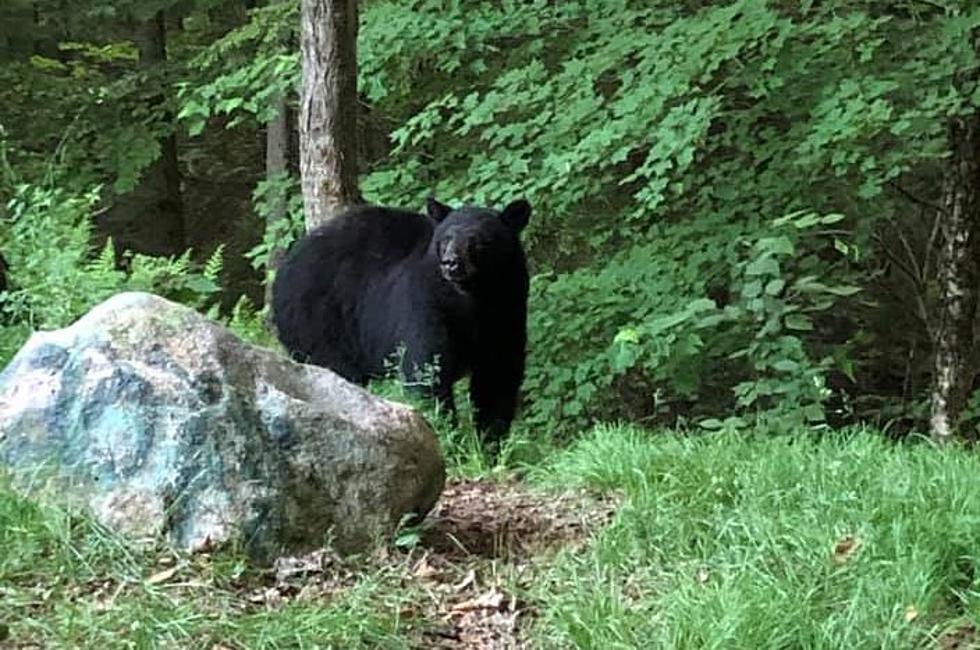
Beware of Bears Coming Out of Hibernation in New York
Beware! Bears will soon be the move and New Yorkers are encountering them more than ever before.
There's a minimum of 6,000 to 8,000 bears in New York State, according to the DEC.
Bears will start to emerge from hibernation in mid-March and they'll be hungry. They are curious animals and spend a great deal of time exploring for food. And they are smart. Bears learn from experience. If they find food, they will be back.
READ MORE: Teen Shoots First Bear & It's a Doozy at 485 Pounds
Watch this smart bear open a door screen door. Luckily, there was another door the bear couldn't get open to get into the house.
Where Are the Bears
Where are the bears in New York state?
50-60% inhabit the Adirondack region
30-35% inhabit the the Catskill region
10-15% inhabit the central-western region.
Bears are now well established in many other areas, including the Tug Hill, Hudson Valley, and across the Southern Tier.
READ MORE: Hiker's Terrifying Run-In With Bear in New York Mountains
Tips to Avoid Bears
The DEC has tips on what to do if you encounter a bear.
Do:
- Use noise to scare bears away: Yell, clap, or bang pots immediately upon sighting a bear.
- Stay calm: Walk slowly and speak in a loud and calm voice.
- Leave slowly: Cautiously back away from the bear and leave the area.
Don't:
- Approach, surround, or corner a bear: Bears aggressively defend themselves when they feel threatened. Be especially cautious around cubs as mother bears are very protective.
- Run from a bear: They may chase.
- Throw your backpack or food bag at an approaching bear: This will only encourage bears to approach and "bully" people to get food. By teaching a bear to approach humans for food, you are endangering yourself, other campers/residents, and the bears.
- Further Action
- If a bear approaches you: Raise your arms and speak in a loud, calm voice while backing away.
- If a bear charges you: Stand your ground. If you have bear spray, dispense directly at the bear.
- If a bear follows you: Stand your ground. Intimidate by making yourself look bigger by waving arms, clapping, shouting, or banging sticks. Prepare to fight or use bear spray.
- If a bear makes contact with you: Fight back with anything at hand (knife, stick, rocks, or fists).
READ MORE: You'll Bare-ly Believe How Close Hunter Gets to Bear in New York
To Avoid Bears Coming Onto Your Property:
- Take down bird feeders in April. Bird feed such as suet and seeds are a very strong attraction for bears, even if they can't reach them.
- Clean your grill. Turn the grill on high for several minutes after you are done cooking to burn residual odors.
- Lock up your trash. Garbage is extremely attractive to bears. It should always be kept in sealed garbage cans inside a building like a garage or shed. Anything with an odor can attract a bear.
- Do not feed your pets outside. Leftover food or even an empty dish can attract a bear.
- Do not have refrigerators or freezers outside or on porches. Bears can smell what is inside.
If You're Camping:
- Throw out all your trash and recyclables.
- Lock up your coolers and food. Store food in either the trunk of your car or in the cab of your truck. Keep windows shut and food and coolers out of sight.
- NEVER keep food, coolers, or scented items in your tent.
- Treat all toiletries as food items. Toiletry products are heavily scented and are as attractive to bears as actual food.
- Clean up after all meals immediately. Keep grills, pots, pans, cooking utensils, and wash basins clean when not in use.
- Do not put grease, garbage, plastic diapers, cans, bottles, or other refuse into the fireplace. These items do not properly burn and will attract bears with their odors.
- Always remember when exploring the wilderness - you're in their home. Be vigilant and stay safe.
Bear Destroys Vehicle in Search of Food
Gallery Credit: Credit - Polly McAdams
Bears from around the world
Gallery Credit: Randy Bogden, Getty Images
More From Hudson Valley Post








